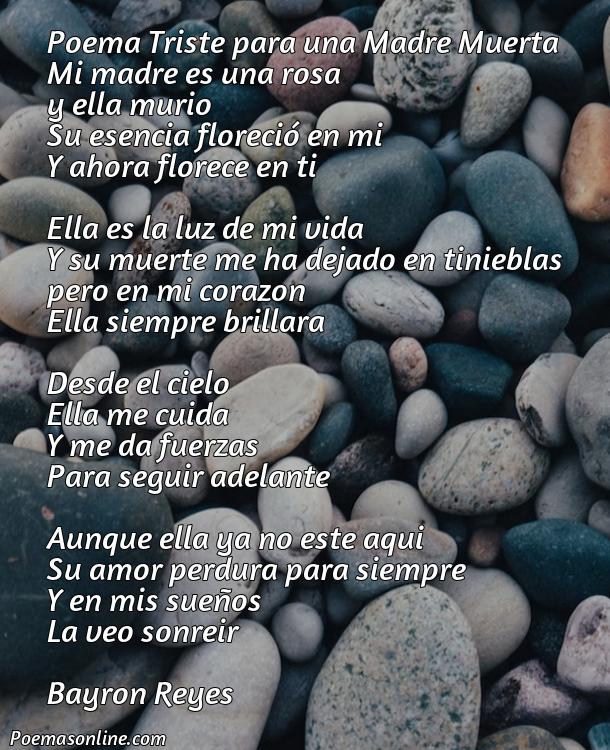Let me tell you somethin’ straight from the heart. We’ve all been there—those moments when you feel like the world’s crashing down on you, and the weight of loss feels unbearable. If you’ve ever found yourself thinking, “triste extraño a mi madre muerta,” you’re not alone. Grieving for a loved one, especially a mother, is one of the hardest experiences any human can go through. It’s raw, it’s painful, and it’s something that sticks with you forever.
But here’s the thing—it’s okay to feel this way. In fact, it’s more than okay; it’s necessary. Acknowledging your pain and working through it is an important part of healing. This article is here to guide you, to help you understand what you’re feeling, and to provide some tools to navigate this difficult journey. You’re not alone in this, and there’s hope for brighter days ahead.
So, let’s break it down together. We’ll explore the emotional complexities of losing a mother, the stages of grief, and strategies to cope with the overwhelming sadness. By the end of this, my hope is that you’ll feel a little less alone and a little more equipped to handle the weight of “triste extraño a mi madre muerta.”
Read also:Becky G Hair The Ultimate Guide To Her Iconic Styles And Transformation
Understanding the Depth of "Triste Extraño a Mi Madre Muerta"
When we talk about “triste extraño a mi madre muerta,” we’re diving into the emotional abyss of losing someone who’s been a cornerstone of our lives. A mother isn’t just a figure in our family tree; she’s often the glue that holds everything together. Her absence leaves a void that’s hard to fill, and the sadness can feel like it’ll never subside.
Why Does Losing a Mother Feel So Different?
There’s something uniquely devastating about losing a mother. It’s not just about the loss of a person; it’s about losing a part of yourself. Mothers play so many roles—nurturer, protector, confidant, and sometimes even best friend. When they’re gone, it’s like losing a piece of your identity.
- Mothers are often the emotional center of the family.
- They provide unconditional love and support.
- Their absence can create a sense of disconnection.
So, when you say, “triste extraño a mi madre muerta,” you’re expressing more than just sadness. You’re acknowledging the depth of the relationship and the profound impact her loss has on your life.
The Stages of Grief: What to Expect
Grief isn’t linear, but understanding its stages can help you make sense of what you’re feeling. Elisabeth Kübler-Ross famously outlined five stages of grief: denial, anger, bargaining, depression, and acceptance. Let’s break them down:
Denial
This is often the first reaction to loss. You might find yourself thinking, “This can’t be happening,” or even pretending that your mother is still around. Denial is a defense mechanism that gives you time to process the reality of the situation.
Anger
Anger can creep in as you start to face the truth. You might feel angry at the world, at God, or even at yourself. It’s a natural response to the unfairness of losing someone so important.
Read also:How Many Fncs Has Benfn Won The Ultimate Guide
Bargaining
In this stage, you might find yourself bargaining with a higher power. “If only I had done something differently, she’d still be here.” Bargaining is a way of trying to regain control over a situation that feels completely out of your hands.
Depression
This is where the weight of the loss hits hardest. You might feel overwhelming sadness, hopelessness, and even isolation. It’s a deep, dark place, but it’s also a crucial part of the healing process.
Acceptance
Acceptance doesn’t mean you’re okay with the loss; it means you’ve come to terms with it. You start to rebuild your life around the new reality, finding ways to honor your mother’s memory and move forward.
How to Cope with the Loss of a Mother
Coping with the loss of a mother is a deeply personal journey, but there are some strategies that can help you navigate this difficult time.
Lean on Your Support System
Don’t be afraid to lean on friends, family, or support groups. Talking about your feelings can be incredibly healing. You don’t have to go through this alone.
Find Ways to Honor Her Memory
Creating rituals or traditions to honor your mother can be a powerful way to keep her memory alive. This could be anything from planting a tree in her honor to starting a charity in her name.
Seek Professional Help
Therapy or counseling can be incredibly beneficial during this time. A professional can help you work through your emotions and develop healthy coping mechanisms.
Common Triggers and How to Handle Them
There are certain triggers that can make the grief feel even more intense. Holidays, birthdays, and anniversaries can be especially difficult. Here’s how to handle them:
Prepare for Trigger Days
Knowing that certain days will be tough can help you prepare. Plan ahead by surrounding yourself with supportive people or engaging in activities that bring you comfort.
Create New Traditions
Instead of avoiding trigger days, try creating new traditions that honor your mother. This can help you find joy and meaning in what might otherwise be a difficult time.
Long-Term Healing: Building a New Normal
Healing from the loss of a mother is a lifelong journey. It’s about finding ways to integrate her memory into your life in a positive way.
Embrace Your Memories
Memories are a gift. Instead of avoiding them, embrace them. Share stories about your mother with others, or write them down in a journal. This keeps her legacy alive.
Focus on What You Can Control
While you can’t control the fact that she’s gone, you can control how you choose to live your life in her honor. Focus on the things that bring you joy and fulfillment.
Understanding the Impact on Mental Health
Grieving the loss of a mother can have a significant impact on your mental health. It’s important to recognize the signs of prolonged grief and seek help if needed.
Signs of Complicated Grief
Complicated grief is when the grieving process becomes so intense that it interferes with your ability to function. Symptoms include:
- Intense longing or yearning for the deceased.
- Difficulty accepting the death.
- Feeling that life is meaningless without them.
If you’re experiencing these symptoms, it’s important to reach out for professional help.
Resources for Support
There are plenty of resources available to help you through this difficult time. Here are a few:
Support Groups
Joining a support group can be incredibly helpful. It provides a safe space to share your feelings with others who understand what you’re going through.
Online Resources
Websites like GriefShare and What’s Your Grief offer a wealth of information and resources for those dealing with loss.
Conclusion: Moving Forward with Hope
Losing a mother is one of the hardest things anyone can go through. The pain of “triste extraño a mi madre muerta” can feel overwhelming, but it’s important to remember that healing is possible. By understanding the stages of grief, finding healthy coping mechanisms, and leaning on your support system, you can begin to rebuild your life.
So, take it one day at a time. Honor her memory, embrace your feelings, and don’t be afraid to ask for help when you need it. You’re stronger than you think, and brighter days are ahead.
And hey, if you’ve found this article helpful, don’t forget to share it with someone who might need it. Let’s spread the love and support one another through this journey of life and loss.
Table of Contents
- Understanding the Depth of "Triste Extraño a Mi Madre Muerta"
- The Stages of Grief: What to Expect
- How to Cope with the Loss of a Mother
- Common Triggers and How to Handle Them
- Long-Term Healing: Building a New Normal
- Understanding the Impact on Mental Health
- Resources for Support
- Conclusion: Moving Forward with Hope


